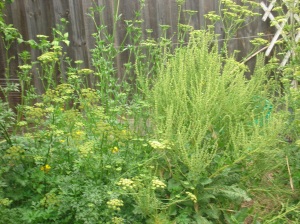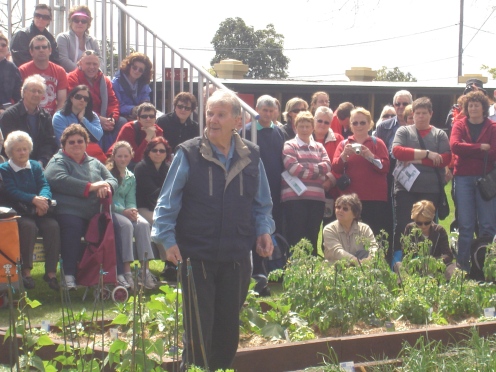NARRATIVE OF RESEARCH
What influences the Melbourne community’s ability to garden for self-sufficiency in a sustainable manner? A redefinition of waterwise gardening which includes edible plants may be necessary.
A redefinition of waterwise gardening which includes edible plants may be necessary.
All self sufficiency or food gardeners across Melbourne need support in keeping their productive gardens producing in a drying climate. The active Melbourne garden community has recognised this and has developed the grassroots network, the Food Gardeners Alliance, as well as many innovative projects and partnerships.
A significant number of respondents interpreted sustainable and self sufficient as the same thing, whereas others shared the assumptions of the research that self sufficiency gardening was the act of, or outcome of productive gardening, and sustainable was the preferred garden method.
Respondents attributed a variety of interconnecting variables and themes that were leading to an increase in self sufficiency gardening in the community and offered a range of anecdotal evidence to support their opinions. The far majority of respondents referred to environment-related issues.
One of the most common suggestions from respondents was that growing environmental awareness in the community has led more people to make the connection to growing their own food. Drought is having a strong impact. According to varied views, climate change is encouraging people into self sufficient gardening, while its impact on hydrological regimes is significantly deterring and impeding others.
Food plants require a lot of water, and water restrictions were found to be a significant problem for food growing at home and in community gardens. However, it appears that a number of people in the community are moving toward sustainable gardening practices before giving up altogether. There is need and opportunity for water conservation in the vegetable patch.
Perceived health benefits are encouraging food growing, due to quality, freshness, nutrition and therapeutic benefit. Health benefits are tied in with the embrace of organics and a rejection of chemicals in the garden. The cost of food is also a factor, as was the broader costs of living. Economic conditions could become another significant influence, and concern about community food security is growing, though the food miles concept is having more impact.
From the perspective of the research findings, as a concept, sustainable gardening is currently much more prevalent on the minds of the community than self sufficiency gardening. The variable of gardener effort may be at play here, simply due to the fact that it may be easier to keep your garden alive, but not as easy to keep it productive in these times of low rainfall.

Peter Cundall in his demonstration garden patch. Grow Beans, Grow Potatoes, rip up you lawn and Grow Potatoes
Community food security is neccessary. Growing the food where we are living reduces embodied carbon emissions (food miles) and water in food production, and builds community networks. Growing our own food allows us greater diversity of foods on our plates, harvest sharing between friends and neighbours, and more balanced food nutrition on a limited budget. With climate change, heirloom seed preservation becomes more urgent.
The Report & educational weblinks are on the right. New posts continue to explore the topic. To contact the report and blog author, email danielchristophermoss@gmail.com

[…] a little comparison and found a similar project in my new home of Melbourne. A study can be found Here. The serious problem that the research brings up is, like LA, Melbourne deals with a serious water […]
Community Garden Projects « Ian Coe v. World said this on October 20, 2010 at 3:54 pm |